Introduction
Benzodiazepines, often referred to as "benzos," are a class of psychoactive drugs that have been widely prescribed for decades to treat a range of conditions, including anxiety, insomnia, seizures, and muscle spasms. Despite their effectiveness, benzodiazepines are also associated with significant risks, including dependency, withdrawal symptoms, and potential misuse. This blog will explore what benzodiazepines are, how they work, their medical uses, potential side effects, and the controversies surrounding their long-term use. By the end, you’ll have a comprehensive understanding of benzodiazepines and their impact on mental health.
What Are Benzodiazepines?
Benzodiazepines are a class of drugs that act as central nervous system (CNS) depressants. They enhance the effect of gamma-aminobutyric acid (GABA), a neurotransmitter that inhibits brain activity. By increasing GABA activity, benzodiazepines produce calming effects, making them effective for treating conditions like anxiety and insomnia.
First introduced in the 1960s, Benzodiazepines quickly gained popularity due to their efficacy and relatively low risk of acute toxicity compared to older sedatives like barbiturates. Common benzodiazepines include diazepam (Valium), alprazolam (Xanax), lorazepam (Ativan), and clonazepam (Klonopin).
How Do Benzodiazepines Work?
Benzodiazepines work by binding to specific receptors on GABA-A receptors in the brain. GABA is the primary inhibitory neurotransmitter, meaning it reduces the activity of neurons. When benzodiazepines enhance GABA’s effects, they slow down the central nervous system, leading to:
Reduced anxiety
Muscle relaxation
Sedation
Anticonvulsant effects
This mechanism makes benzodiazepines highly effective for short-term relief of symptoms. However, their impact on the brain’s reward system also makes them prone to misuse and dependency.
Medical Uses of Benzodiazepines
Benzodiazepines are prescribed for a variety of medical conditions, including:
Anxiety Disorders: Benzodiazepines are commonly used to treat generalized anxiety disorder (GAD), panic disorder, and social anxiety disorder. They provide rapid relief from acute anxiety symptoms.
Insomnia: Short-acting benzodiazepines like temazepam are sometimes prescribed for short-term treatment of severe insomnia.
Seizure Disorders: Benzodiazepines like clonazepam and diazepam are used to manage epilepsy and acute seizures.
Muscle Spasms: These drugs can relieve muscle spasms caused by conditions like cerebral palsy or spinal cord injuries.
Alcohol Withdrawal: Benzodiazepines help manage withdrawal symptoms in individuals recovering from alcohol dependence.
Preoperative Sedation: They are often used to calm patients before surgery or medical procedures.
While benzodiazepines are effective for these conditions, they are typically recommended for short-term use due to the risk of dependency and tolerance.
Side Effects of Benzodiazepines
Like all medications, benzodiazepines come with potential side effects. Common side effects include:
Drowsiness
Dizziness
Confusion
Impaired coordination
Memory problems
Slurred speech
In some cases, benzodiazepines can cause more severe side effects, such as:
Paradoxical reactions (increased anxiety or agitation)
Depression
Respiratory depression (especially when combined with other CNS depressants like alcohol)
Dependency and withdrawal symptoms
Risks and Controversies Surrounding Benzodiazepines
Despite their therapeutic benefits, benzodiazepines are not without controversy. Some of the key concerns include:
Dependency and Addiction: Prolonged use of benzodiazepines can lead to physical and psychological dependency. The body may develop tolerance, requiring higher doses to achieve the same effect.
Withdrawal Symptoms: Abrupt discontinuation of benzodiazepines can cause severe withdrawal symptoms, including rebound anxiety, insomnia, tremors, and even seizures. Tapering off the medication under medical supervision is essential.
Cognitive Impairment: Long-term use of benzodiazepines has been linked to cognitive decline, particularly in older adults. This includes memory problems and an increased risk of dementia.
Misuse and Overdose: Benzodiazepines are sometimes misused for their sedative effects. When combined with other substances like alcohol or opioids, they can lead to fatal overdoses.
Limited Long-Term Efficacy: Research suggests that benzodiazepines lose their effectiveness over time, making them less suitable for chronic conditions like anxiety or insomnia.
Alternatives to Benzodiazepines
Given the risks associated with benzodiazepines, many healthcare providers are turning to alternative treatments for anxiety, insomnia, and other conditions. These alternatives include:
Selective Serotonin Reuptake Inhibitors (SSRIs): SSRIs like sertraline (Zoloft) and fluoxetine (Prozac) are often prescribed for anxiety and depression. They have a lower risk of dependency compared to benzodiazepines.
Cognitive Behavioral Therapy (CBT): CBT is a highly effective, non-pharmacological treatment for anxiety and insomnia. It helps individuals identify and change negative thought patterns and behaviors.
Melatonin and Other Sleep Aids: For insomnia, melatonin supplements or non-benzodiazepine sleep aids like zolpidem (Ambien) may be recommended.
Mindfulness and Relaxation Techniques: Practices like meditation, yoga, and deep breathing can help manage anxiety and improve sleep quality.
Exercise: Regular physical activity has been shown to reduce anxiety and improve overall mental health.
How to Use Benzodiazepines Safely
If you are prescribed benzodiazepines, it’s important to use them responsibly to minimize risks. Here are some tips for safe use:
Follow Your Doctor’s Instructions: Take benzodiazepines exactly as prescribed. Do not increase the dose or duration without consulting your healthcare provider.
Avoid Alcohol and Other CNS Depressants: Combining benzodiazepines with alcohol or other sedatives can lead to dangerous side effects, including respiratory depression.
Monitor for Side Effects: Be aware of potential side effects and report any concerning symptoms to your doctor.
Do Not Stop Suddenly: If you need to discontinue benzodiazepines, work with your doctor to taper off the medication gradually to avoid withdrawal symptoms.
Consider Short-Term Use: Whenever possible, limit benzodiazepine use to short-term relief of symptoms.
The Future of Benzodiazepines
As awareness of the risks associated with benzodiazepines grows, the medical community is reevaluating their role in treatment. Many experts advocate for stricter prescribing guidelines and greater emphasis on non-pharmacological treatments for anxiety and insomnia.
Research is also underway to develop safer alternatives to benzodiazepines. For example, drugs that target specific GABA receptors without the risk of dependency are being explored. Additionally, advancements in psychotherapy and digital health tools offer promising alternatives for managing mental health conditions.
Conclusion
Benzodiazepines have played a significant role in the treatment of anxiety, insomnia, and other conditions for decades. While they are effective for short-term relief, their potential for dependency, withdrawal symptoms, and long-term risks cannot be ignored. As our understanding of mental health evolves, so too must our approach to treatment. By exploring alternatives and using benzodiazepines responsibly, we can ensure that patients receive the care they need without compromising their long-term well-being.
If you or someone you know is struggling with anxiety, insomnia, or dependency on benzodiazepines, seek help from a qualified healthcare professional. With the right support and treatment, it is possible to achieve better mental health and quality of life.
FAQs About Benzodiazepines
Are benzodiazepines addictive?
Yes, benzodiazepines can be addictive, especially with long-term use. Dependency can develop, leading to withdrawal symptoms if the medication is stopped abruptly.Can I take benzodiazepines with alcohol?
No, combining benzodiazepines with alcohol can be dangerous and increase the risk of severe side effects, including respiratory depression.How long does it take for benzodiazepines to work?
Benzodiazepines typically take effect within 30 minutes to an hour, making them useful for acute symptom relief.What should I do if I miss a dose?
If you miss a dose, take it as soon as you remember. However, if it’s close to the time for your next dose, skip the missed dose and continue with your regular schedule.Are there natural alternatives to benzodiazepines?
Yes, natural alternatives like mindfulness, exercise, and herbal supplements (e.g., valerian root) may help manage anxiety and insomnia. However, consult your doctor before trying any new treatments.







